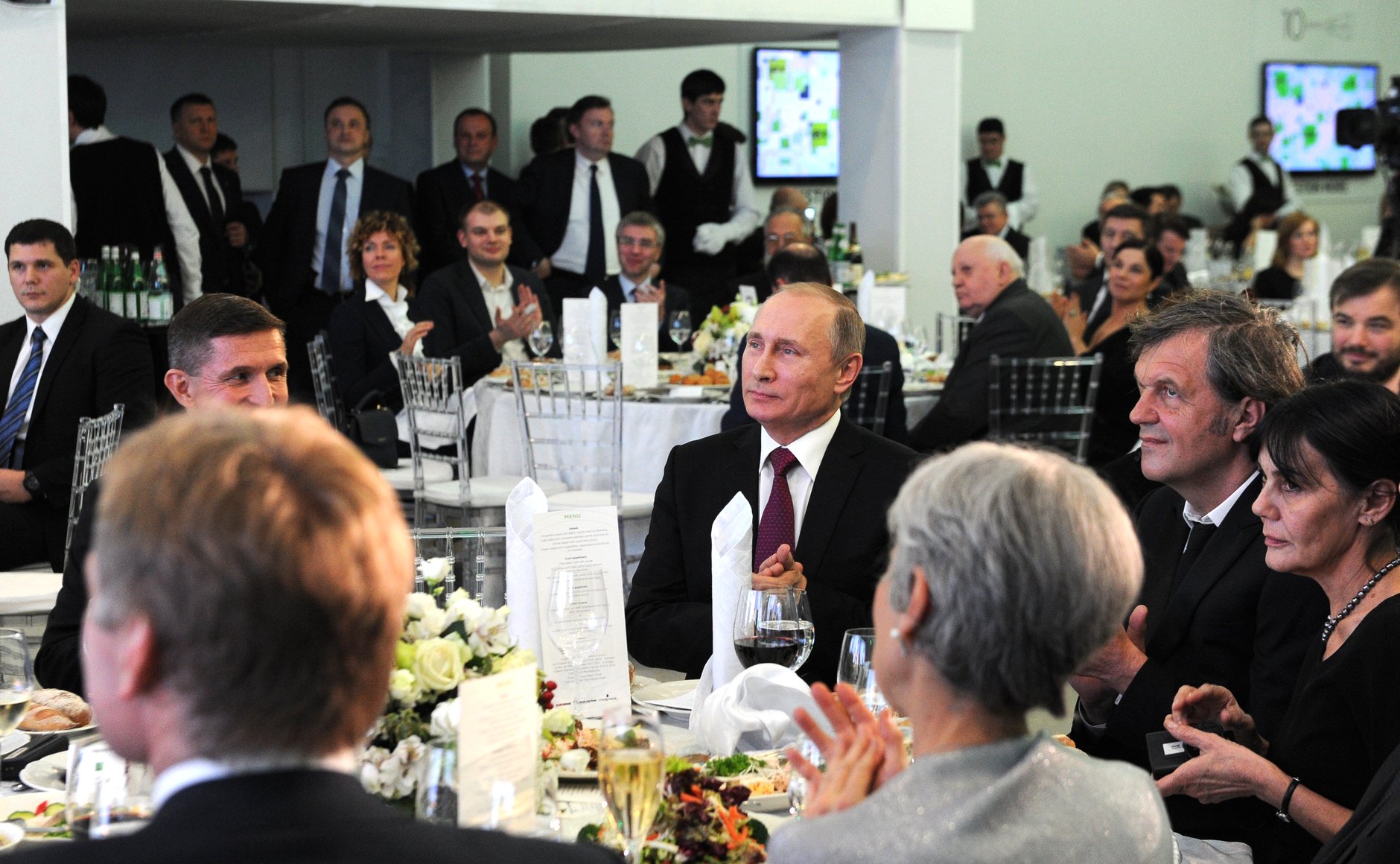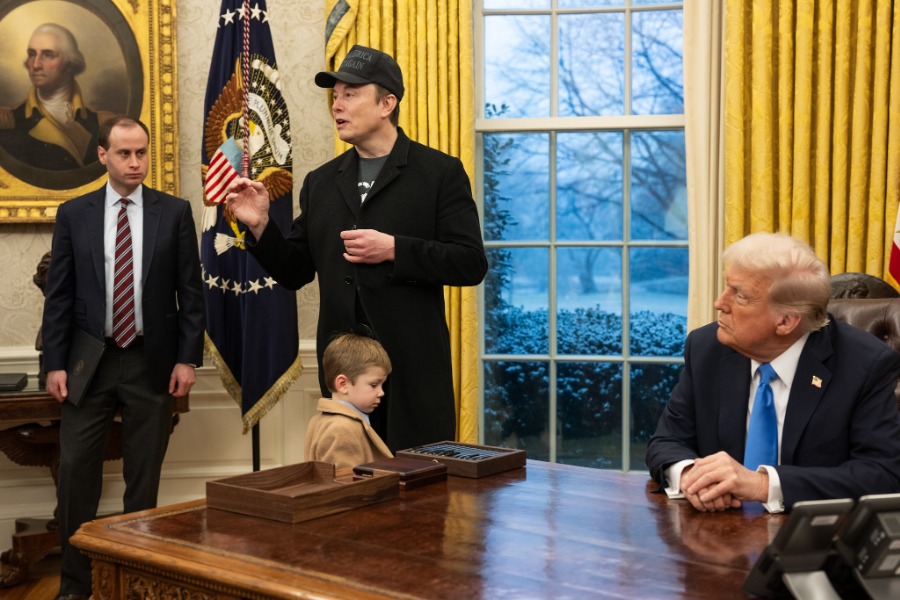What Lies Behind Flynn's Public Request for Immunity?
Lawfare readers are surely aware that on Thursday, the lawyer for former national security adviser Michael T. Flynn went public with a statement seeking immunity from prosecution in exchange for his testimony to either of the congressional intelligence committees investigating Russia-Trump matters.

Published by The Lawfare Institute
in Cooperation With

Lawfare readers are surely aware that on Thursday, the lawyer for former national security adviser Michael T. Flynn went public with a statement seeking immunity from prosecution in exchange for his testimony to either of the congressional intelligence committees investigating Russia-Trump matters. Flynn's attorney offered a teaser: "Flynn certainly has a story to tell, and he very much wants to tell it, should the circumstances permit." The Wall Street Journal reports that Flynn's lawyer also approached the FBI with the same offer.
A common view among the media and pundits seems to be that Flynn's move is a sign of weakness—that he is legitimately scared of prosecution and looking for protection. But that may not be the best read of the publicly-known facts.
Alex Whiting at Just Security has outlined a procedural reason to think that Flynn is not making a serious overture to criminal enforcement authorities: his lawyer is not behaving in the way that an experienced defense attorney would if truly intent on a deal with prosecutors and the FBI. In that case, seeking a private proffer session, not making a splashy public announcement, would be the right way to proceed.
Flynn and his lawyers may actually think that he has a rather low chance of being successfully prosecuted. There are a number of reasons why that could be so. And if that is right, Flynn's actions might be best understood as a smart play by someone seeking a clear win, rather than a desperate attempt to minimize losses.
Who Would Indict Flynn, and for What?
While the FBI is headed by someone (Director James Comey) who seems genuinely committed to getting to the bottom of the Russia-Trump mess, the FBI can only recommend criminal charges. Prosecutors at the Department of Justice are the ones who decide. But while Attorney General Jeff Sessions—like Flynn, a member of Donald Trump's inner circle during the campaign—has recused himself from "from any existing or future investigations of any matters related in any way to the campaigns for President of the United States,” that arguably does not cover the crimes with which Flynn might be charged.
Based on what is now publicly known, Flynn seems to have the most criminal exposure about three matters. First, he might be charged under the false statements statute with lying to the FBI about his December communications with Sergey Kislyak, Russia's ambassador to the United States. But that communication occurred over a month after the campaign ended. (And in any event, FBI sources have told the press that charges are unlikely, seemingly because of Flynn's ability to muddy the waters by parsing what he was asked and what he said.) Second, Flynn may have some criminal exposure under the Foreign Agents Registration Act for his dealings last year with the Turkish government. But that occurred in his capacity as a private consultant, working through his company Flynn Intel Group. Of course, clients likely sought him out because of his close ties to the Republican nominee for president, but that does not mean the actions are campaign-related. Third, some have raised the issue of whether Flynn truthfully disclosed on his SF86 security clearance form payments he received from Russian-government linked entities during 2015. Lies on this form can be prosecuted, again under the false statements statute. But this does not seem to be clearly campaign-related; for instance, Flynn was apparently paid for giving a speech at a gala dinner in Russia.
So Jeff Sessions might well be the ultimate decisionmaker on whether Michael Flynn is criminally charged. If he is, I would bet good money that Flynn gets a pass—all the more so because FARA violations and problems on security clearance forms are rarely pursued criminally. That is, Sessions would have a plausible-sounding story to tell that criminal prosecution is not the correct resolution.
If Sessions is not the decisionmaker—either because he broadens his recusal or because Flynn's criminal exposure concerns campaign-related matters within the scope of the existing recusal—the Deputy Attorney General will be in charge. Assuming he is confirmed by the Senate, that will be Rod Rosenstein, a respected career prosecutor who is currently United States Attorney for the District of Maryland. Rosenstein was put in that position by President George W. Bush, who also tried to seat him on the U.S. Court of Appeals for the Fourth Circuit. Because this White House seems to prize loyalty to President Trump above all else—and has blocked senior appointments sought by cabinet members like Secretary of State Rex Tillerson when the nominee was thought insufficiently Trumpist—Rosenstein will have to affirmatively prove that he is willing to aggressively and independently go after a key Trump ally.
The Pardon Power
Even if DOJ indicted Flynn, or was seen to be moving in that direction, Flynn could appeal to his former boss, President Trump, for a pardon. The Supreme Court has confirmed that a pardon issued under the president's Article II constitutional power can be preemptive—coming before charges are filed. And a pardon can also be a blanket one—covering any possible crimes that may have been committed. President Gerald Ford famously issued a pre-prosecution blanket pardon to Richard Nixon.
DOJ has an office that, in the ordinary course, processes and advises the president on pardon applications. While this office has its own rules and standards, a president may choose to disregard all of that. Trump's doing so in order to protect Flynn (and hence himself and other members of his orbit) would of course produce a firestorm of criticism and cries of cover up. But if there is any president who seems willing to ignore considerations of probity and propriety, it's Trump. (See Ben Wittes and Quinta Jurecic on the president's character.) Trump is already on record, via Twitter, supporting Flynn by calling the investigations of him a "witch hunt." Trump also publicly praised Flynn as "a wonderful man" who had been treated "very, very unfairly"—after having fired him.
The White House could even claim a sort of precedent for a Flynn pardon. President George H.W. Bush pardoned six people implicated in the Iran-Contra scandal. Bush had been Vice President during the events in question, was a potential witness in criminal cases against his former colleagues, and was believed by the independent counsel investigating the matter, Lawrence Walsh, to have been intentionally obstructionist. Walsh was furious about the pardon and accused Bush of perpetrating a cover-up. In response, Bush said the independent counsel's prosecutions were merely the "criminalization of policy differences."
Immunity from Congress
If it isn't particularly likely—again, based on what is now publicly known—that Flynn will be successfully prosecuted, why go public seeking immunity? The answer is that even relatively narrowly drawn immunity granted by a congressional committee could end up blocking later prosecutions for the full array of misconduct in which Flynn might have engaged. In other words, the prize sought here is very valuable.
Congress has the statutory power to grant immunity to witnesses testifying before either house or a committee or subcommittee of either house. The Attorney General (or, if recused, the person acting in his or her stead) can delay the issuance of the court order granting immunity, but cannot block it. Congress has a practice of coordinating with law enforcement and prosecutors about immunity grants, but nothing in the law requires this.
As the Senate Intelligence Committee has rebuffed the immunity request, Flynn is probably hoping that House Intelligence Chair Devin Nunes, who already appears to be solidly in the tank for Trump on the Russia matter, will offer him broad immunity. But the statute requires that a congressional committee approve the request for immunity "by an affirmative vote of two-thirds of the members of the full committee." The committee has thirteen Republican and nine Democratic members, so Nunes would need to hold together his Republicans and pick up two Democrats. Flynn would have to offer pretty interesting testimony to get two Democrats to go along with this—something much more than a bare promise of "a story to tell."
It's not impossible to imagine this happening, however. The stakes in the Russia-Trump inquiries are enormous, for the country and for the two political parties. There may well be Democrats on the House Intelligence Committee who decide that whether Michael Flynn serves a year or two in jail or not is much less important than getting to the bottom of what happened.
It's probably a long shot, though, for Flynn, to get immunity from one of the intelligence committees in the near term. Democrats will probably want to get a better sense of what the FBI is uncovering and what other witnesses besides Flynn are saying before offering immunity to a key player like Flynn. But there's no downside to trying for Flynn, and the upside for him is potentially large.
The Iran-Contra Immunity Fiasco
The immunity statute grants only "use immunity." An immunized witness before Congress does not get blanket immunity for the entire transaction about which he or she testifies. Rather, no testimony under the court order granting congressionally-requested immunity, "or any information directly or indirectly derived from such testimony," "may be used against the witness in any criminal case, except a prosecution for perjury, giving a false statement, or otherwise failing to comply with the order."
Why seek such apparently limited use immunity from Congress? In practice, use immunity can turn into full transactional immunity. It turns out that it can be devilishly difficult for prosecutors in a later criminal case to prove that no evidence they are presenting was "directly or indirectly derived" from immunized testimony before Congress.
The prosecutions of Oliver North and John Poindexter for Iran-Contra crimes fell apart in just this way. Both were granted use immunity by a select congressional committee investigating Iran-Contra, and the public testimony under the immunity grants was televised. In the later criminal prosecutions, the D.C. Circuit ruled that protecting the defendants' Fifth Amendment privilege against self-incrimination essentially required the prosecution to affirmatively demonstrate that none of its witnesses were in any way affected by that testimony. This proved impossible.
Witnesses can compound the problems for prosecutors by ranging widely in their immunized congressional testimony. If Flynn were immunized by Congress, it would be for testimony about Russia. But a friendly House committee member, say Chairman Nunes, might lead him to talk about his potentially illegal work for Turkey, thereby extending the immunity in practice to that topic.
There will surely be more public revelations about these matters in the days and weeks to come, revelations that could entirely change what we think we know now. But at present, it does not seem likely to me that Flynn is seeking immunity from the congressional committees because he and his lawyers apprehend a clear and present danger of jail time. Flynn seems rather to be seeking to gain maximum advantage from the congressional committees' and public's legitimate interest in his testimony, and the possibility that Republicans on the House committee might be willing to use their power to help protect him. If House Republicans do this, it will likely be because they assume that Flynn, even though he would be testifying under oath and could not avoid being questioned by Democrats, would do his very best to give testimony that was favorable to President Trump.





